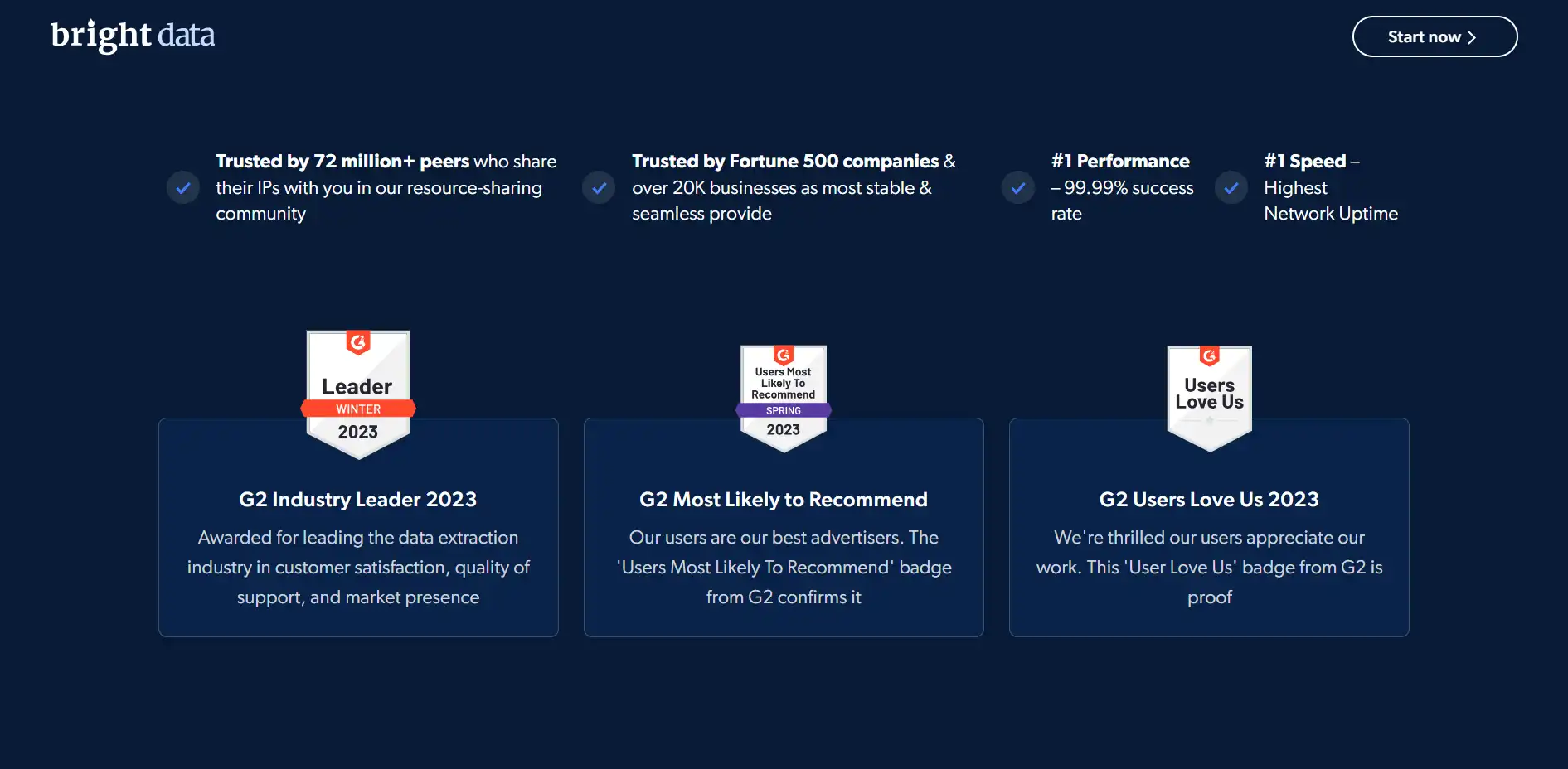Using proxy servers in residential areas can breathe new life into your web scraping or bot software. Unlike IPs from a data center, these addresses come from actual devices, making it easier to blend in.
If you were looking for a place to buy residential proxies, you’ve found it. After reading this article, you will better understand which proxy service providers are worth investing in. Don’t worry; I’ve tested them all and outlined their key features so you can make a well-informed choice.
Don’t have time to scroll down the entire list of Best Residential Proxies? Here are my top 3 picks for ensuring superior performance and dependability.
- Oxylabs (#1 Pick)
- Smartproxy
- Bright Data
What are Residential Proxies?
Let’s start by covering some groundwork. A residential proxy is an IP address an ISP assigns to a single user or household. In contrast to proxy service providers from data centers, residential proxies come from actual user devices.
You can hide that your queries are coming from a datacenter or commercial server by using a proxy service that routes your traffic through residential IP addresses; using a residential proxy, you can pretend to live in a real neighborhood while hiding behind a fake IP. It’s the equivalent of temporarily relocating to a new residence in a different city.
Why do you Need Residential Proxies?
The potentially paramount question. Among the most important ones are:
Analysis of the market and competitors. With residential proxies, you may study the market and your competitors. Websites, forums, and social media can enable inhabitants from distant places to understand local trends, consumer behavior, and competition proposals.
Privacy and anonymity. Residential proxies mask your IP address for enhanced online anonymity. By using a residential proxy, you can increase your anonymity and decrease surveillance by making it seem like your internet activity is coming from a domestic user.
Social media management. Residential proxies can aid social media managers and marketers in managing numerous accounts and reaching regional audiences. Utilizing proxies with IP addresses from specific locations allows you to target local audiences with content and interaction strategies.
Web scraping and data collection are two common uses for residential proxies. They enable the undetectable and unblock able extraction of data from websites. Rotating residential IP addresses is one way to emulate user behavior without triggering anti-scraping measures.
Monitor SEO and ads. You can employ residential proxies for ad verification and search engine optimization. By simulating user actions in various locations, you may examine how ads are shown and how well they perform in search engine rankings.
Gaining access to restricted content. Certain online platforms, services, or websites may apply geographic limits. These limitations can be overcome by using a residential proxy with an IP address from a chosen place to access material or services that aren’t available in your area.
So, if you’re in need of a proxy service, I can help you choose one that meets your needs, whether it’s the fastest residential proxies, the most inexpensive pricing, or something else; let’s get started with the list of top residential proxy services in 2024.
10 Best Residential Proxies in 2025
1) Oxylabs
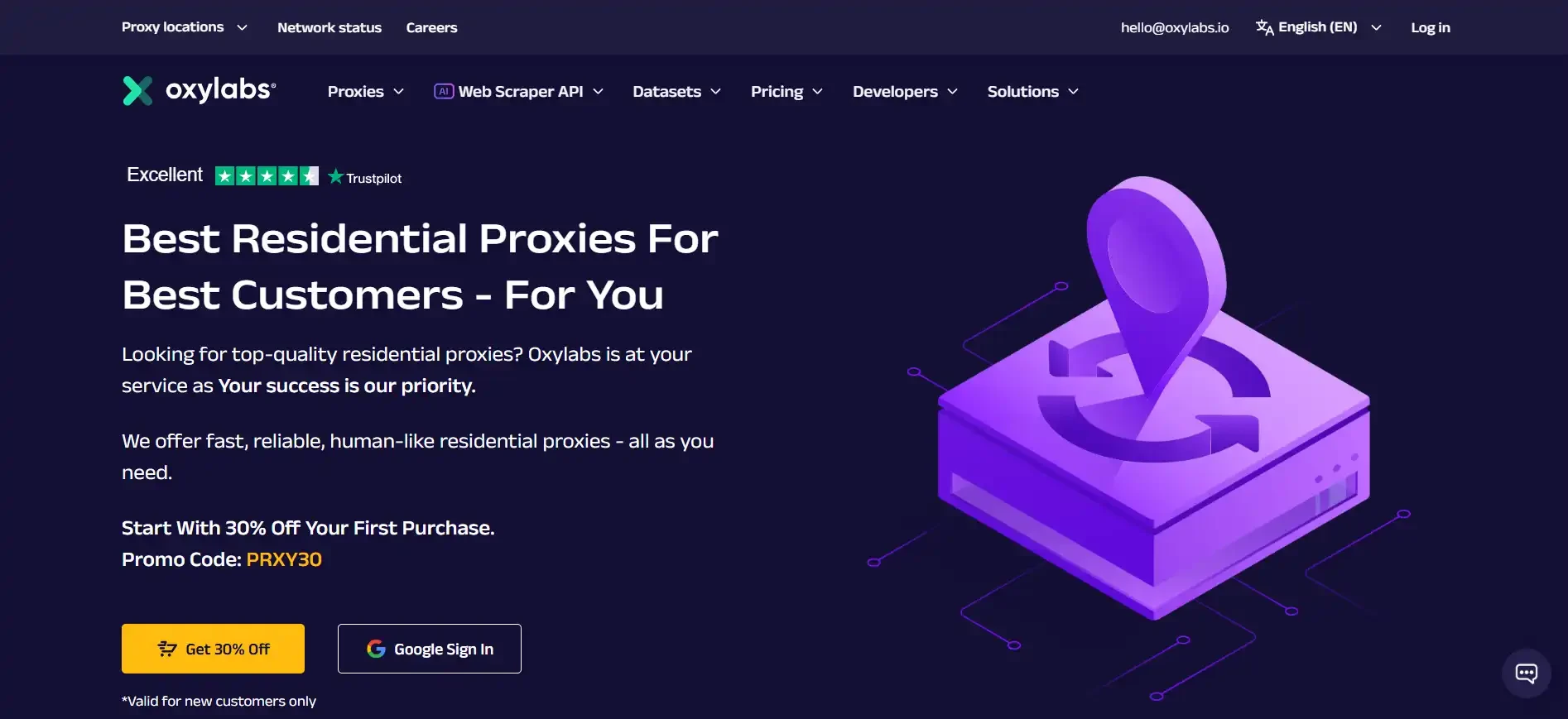
Oxylabs provides the best proxies to assist clients with a wide range of tasks, including pricing intelligence, ad verification, brand protection, travel fare aggregation, market research, and SEO monitoring.
Proxies perform unmatched and are scalable and trustworthy. Numerous rotation customization options, an easy-to-use proxy management dashboard, a personal account manager, and suggestions on improving your scraping success are available. Given its expensive cost, Oxylabs might not be the best option for newcomers or lone users.
With targeting for cities, countries, and ZIP codes, Oxylabs provides 100 million residential IPs and covers 195 locations. It supports SOCKS5, HTTP(S), Zero IP Blocks, rotation of all requests, up to 30 minutes of sticky sessions, round-the-clock live chat assistance, and Prices begin at $300 per month, with pay-as-you-go options.
Click Here to Read the Oxylabs review for more information.
2) Smartproxy
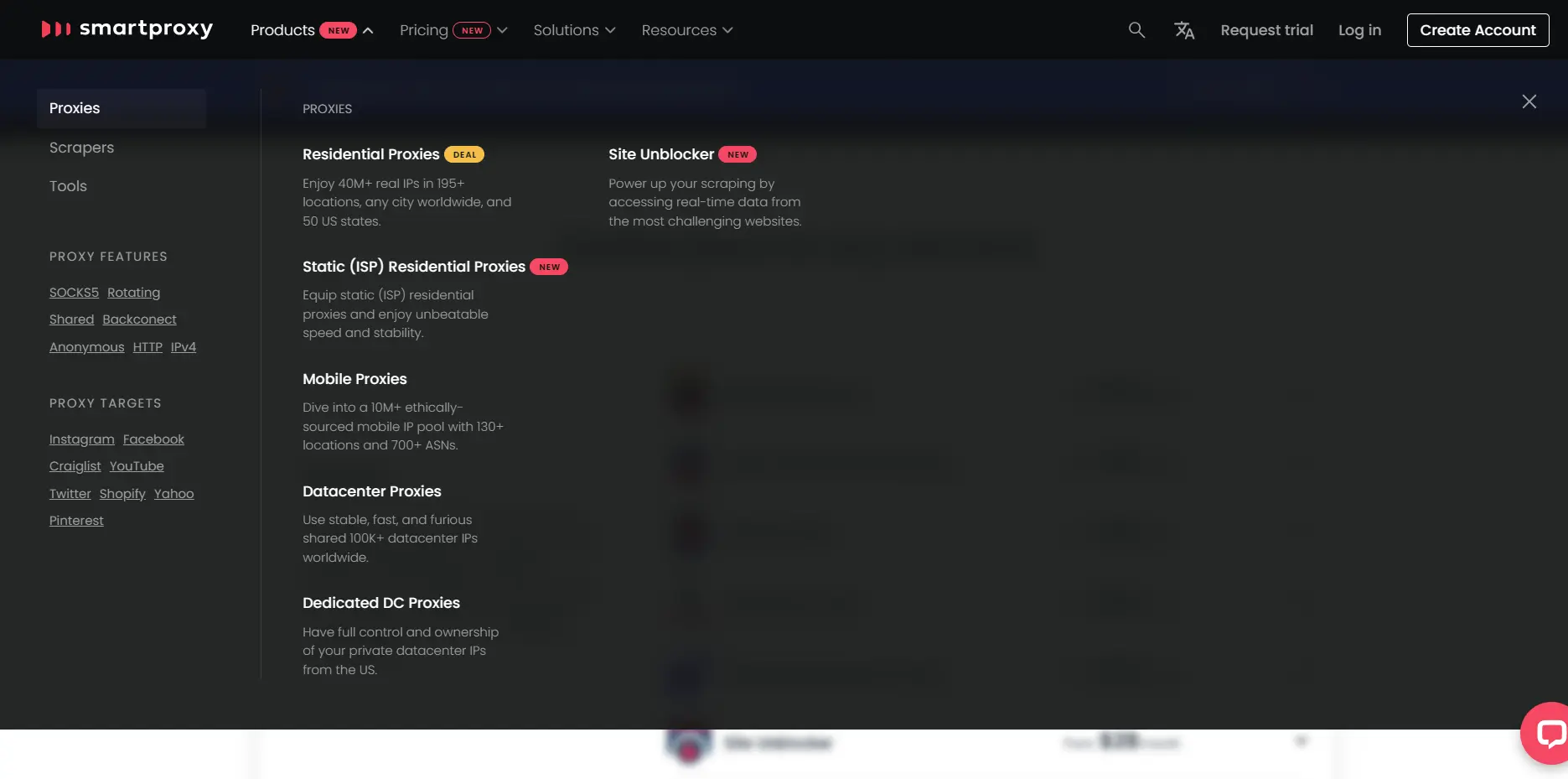
As far as back-connect residential proxies are concerned, Smartproxy is a great place to start. With its 40 million proxies and 195-nation coverage, anyone anywhere in the globe can be targeted.
With its user-friendly design, the service manages to strike a rare balance of affordability, performance, and functionality. Accessible resources include directions, proxy control tools, and first-rate support.
With Smartproxy, users are required to engage with it minimally before using it, thanks to its self-service focus. The one major drawback is that Smartproxy does not support carrier or ASN targeting.
With 99.99% Uptime, 55 million ethically acquired residential IP addresses with targeting by location, state, and nation are available from Smartproxy. Support HTTP(S), SOCKS5, and rotation requests every 10, 30, and 60 minutes, as well as round-the-clock chat and email support. Pricing with the pay-as-you-go option starts at $4/GB.
Click Here to Read the Smartproxy review for more information.
3) Bright Data
Bright Data has one of the largest proxy networks. It provides various options for data collection, such as proxy services. It also provides statistics on a range of topics, such as e-commerce and real estate, and a browsing plugin for users who are not developers.
Bright Data’s residential proxy service has a high success rate and an average response time of less than one second. Users must use ID cards to authenticate their identity. It is designed for large businesses.
Bright Data provides 95 country, city, and ZIP code targeting, 72 million monthly IPs, Third-Party Software Support, Integration, and HTTP and HTTPS Protocol Support for every request through sticky sessions, live chat around the clock, and starting from $500 per month
Click Here to Read Bright Data Review for More Information.
4) SOAX
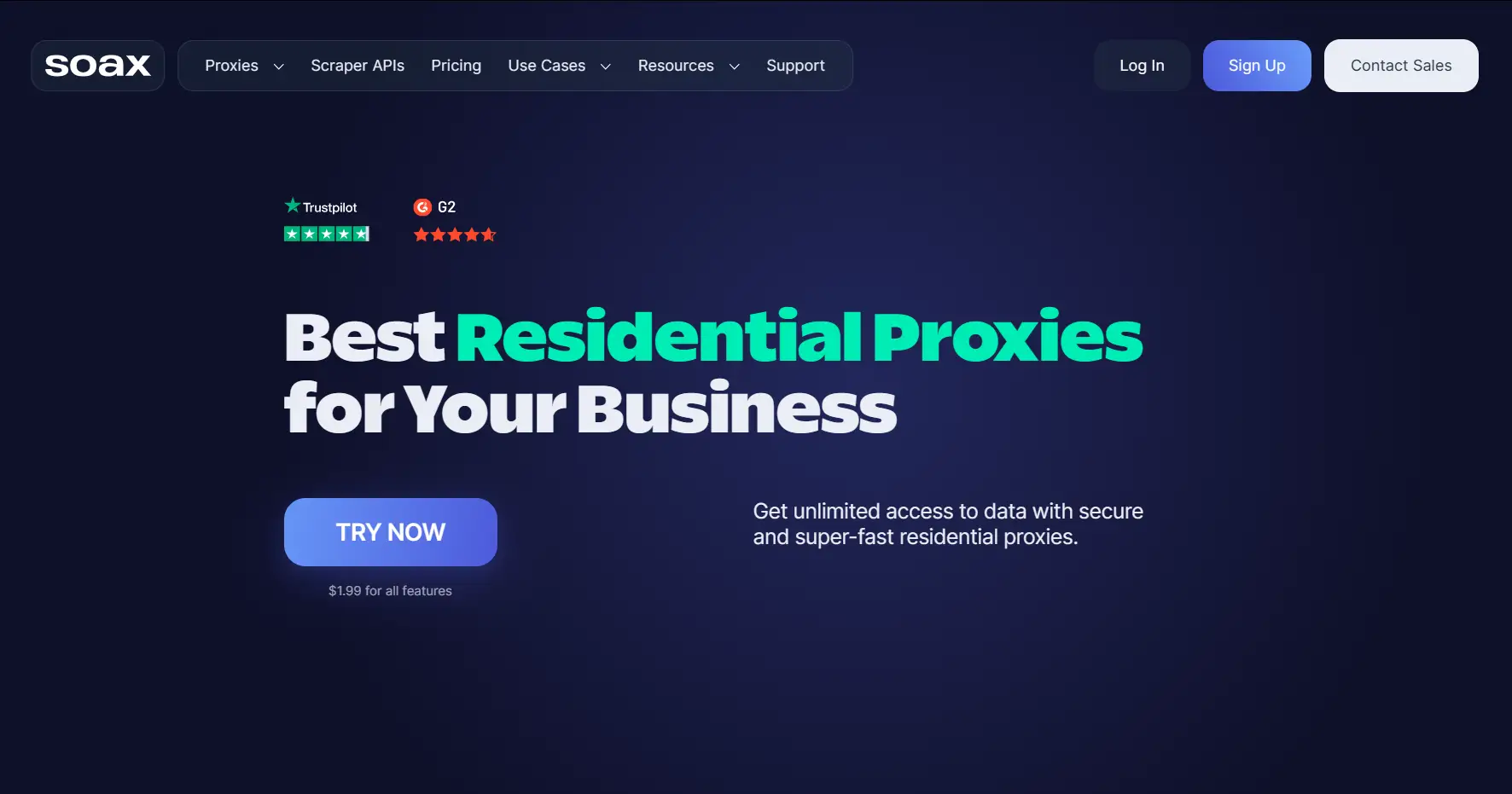
SOAX manages an estimated 5 million residential proxies. Like Smartproxy, it provides a middle ground between inexpensive and free services. Due to its capacity to rotate and target particular areas, SOAX is exceptional.
Both offer great flexibility, letting you switch IP addresses with each connection request, set a strict time restriction, or use the same IP address until it is unavailable. SOAX enables you to target the city, region, and even autonomous system number (ASN) without increasing your bill.
Technical choices like SOCKS5-based HTTP(S) traffic, required IP whitelisting, and constrained ports for plans present questions. This service provider is ideal for you if flexibility is crucial to you.
With 155 million premium residential proxy servers, 195+ locations, rotation technology, city-level targeting, a 0.55-second response time, a 99.5% success rate, and monthly prices ranging from $99 to $10999, SOAX offers a wide range of features.
5) Webshare
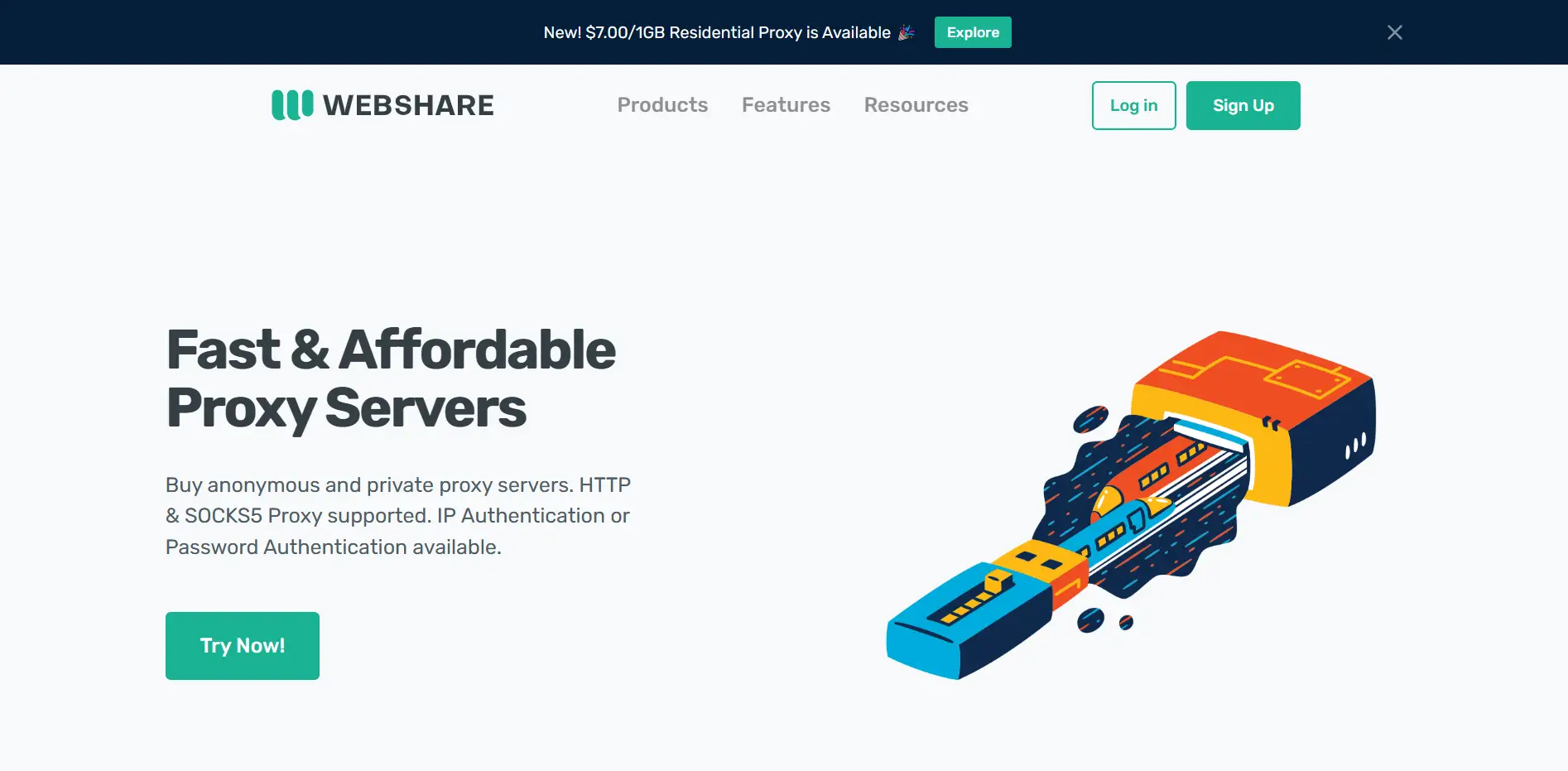
Webshare, an up-and-coming service provider, has expanded its capabilities to include Residential Proxies. Its monthly pool includes 30 million IP addresses that may be individually filtered by 195 regions.
Two of the company’s most decisive selling factors are its self-service model and flexibility. You can set the bandwidth cap yourself or add network priority for a more reliable connection (this function prioritizes your request above those of other users).
Your proxies will be rotated in and out with every request you make. Webshare is one of the most affordable residential proxy services available. However, the service doesn’t allow for unique rotation and only provides a few targeting options.
Webshare offers 30 million residential IP addresses, country targeting, rotation for each request, and support for SOCKS5 and HTTP protocols 195. Residential service misuse is prevented through IP address restrictions and authorization. The cost for one GB starts at $7.
6) IPRoyal
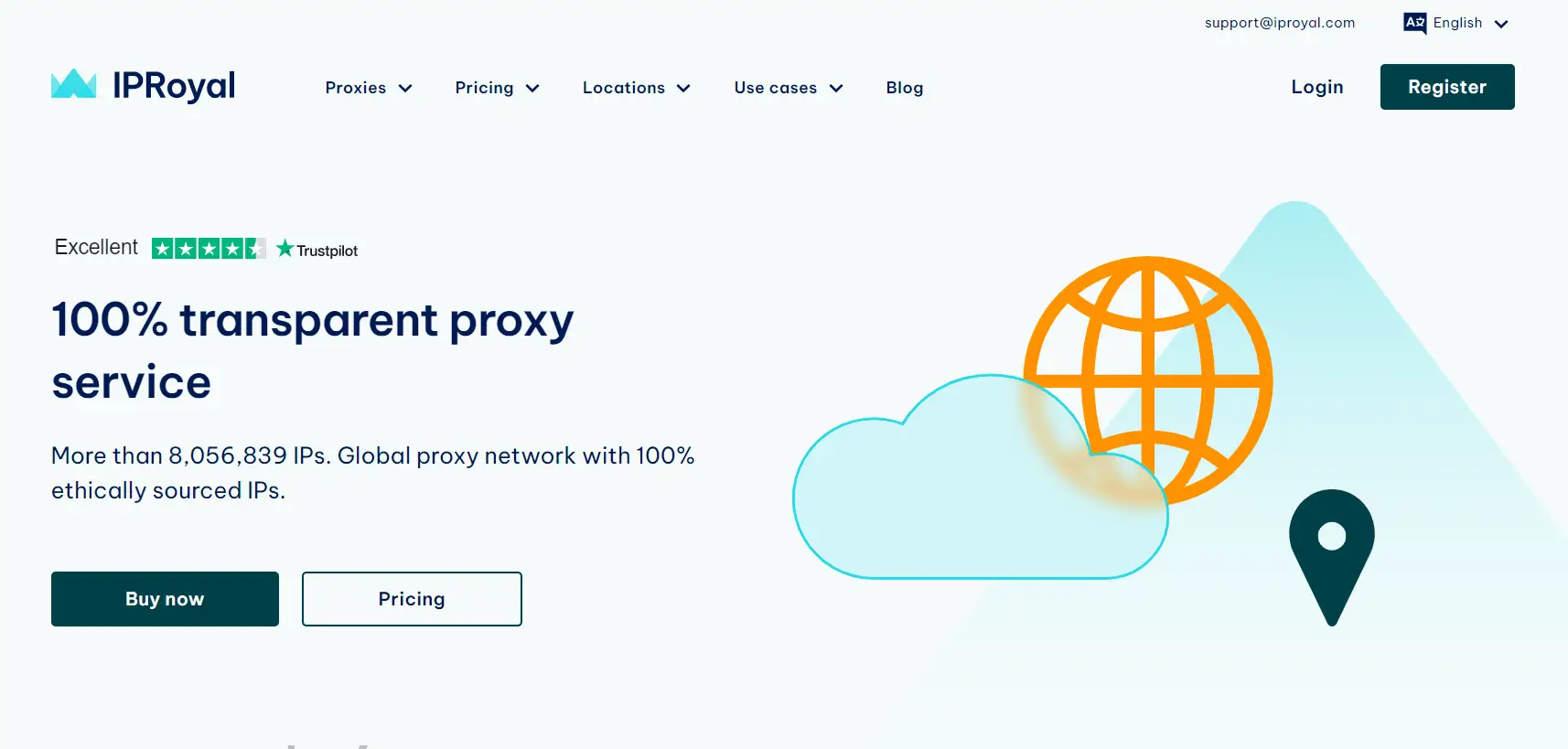
IPRoyal offers lower prices and proxies that are never timed. A terabyte of data costs $3.15, whereas smaller data amounts cost multiple times as much per gigabyte. Filtering and rotation settings can be adjusted as needed, and there is quick response time and SOCKS5 support. Proxies are inefficient, yet they can still perform essential functions.
The main drawback of IPRoyal’s proxy pool is its small size. It’s more compact than most similar services. There is a correlation between proxy cost and resale value, making it unfit for widespread use or IP address dependability.
With IPRoyal, you may choose from 195+ countries, state and city-specific targeting, rotating and sticky sessions, and compatibility for SOCKS5. Switching out the proxy every 1,10, and 30 minutes and Static proxies cost $1.80/day, and IPRoyal’s premium residential proxy service starts at $1.75/GB of bandwidth.
7) NetNut
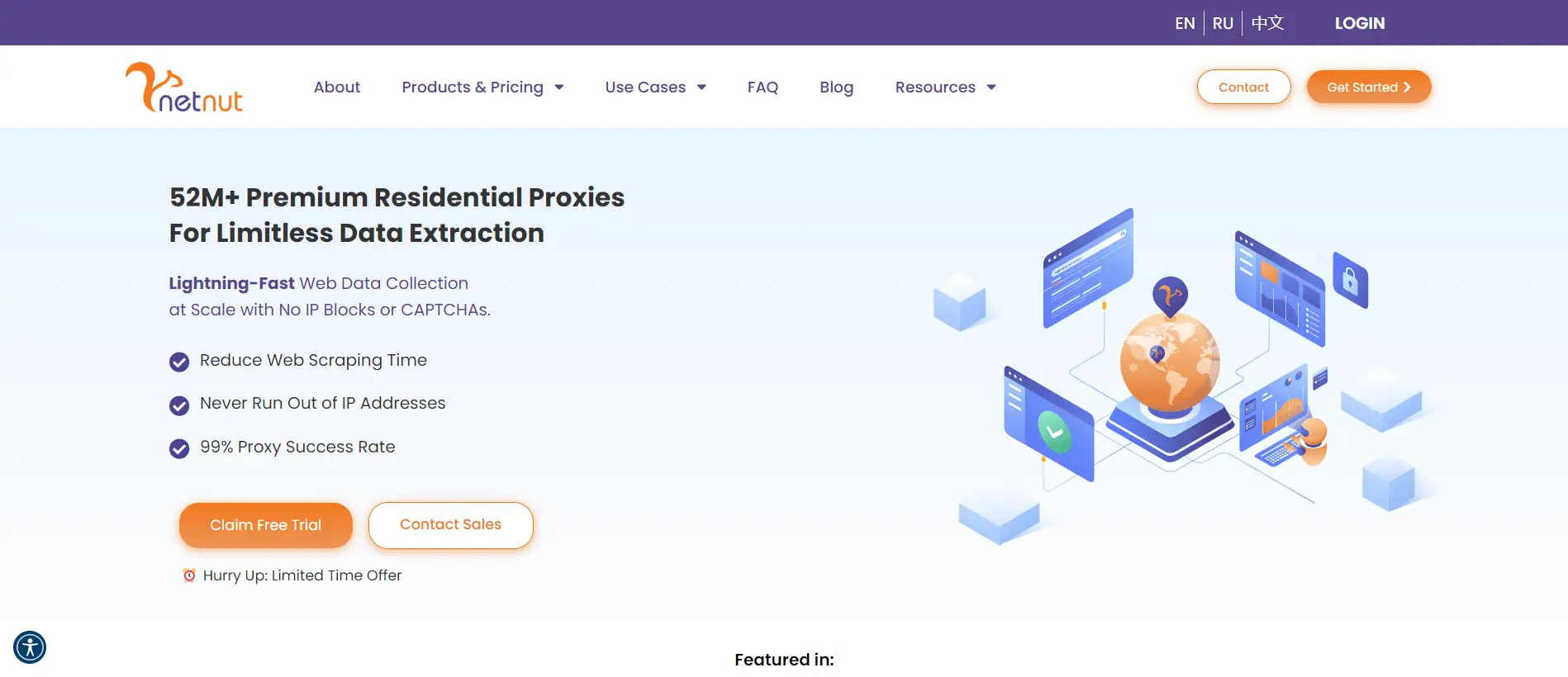
The creative architecture of NetNut allows residential IPs to enjoy one-hop ISP access. Our home proxy network connects you to the destination URL through transparent load balancing, guaranteeing complete anonymity and blazingly fast speeds.
NetNut provides users with access to a wide range of residential proxies, including both dynamic and static IP addresses. Although it blends Internet service provider (ISP) and peer-to-peer (P2P) alternatives to deliver the best possible service, it offers ISP proxies rather than residential ones when selecting servers in the United States.
It provides a nearly 0% failure rate, anti-bot bypass, and 99% uptime guarantee for residential proxy IPs that are among the most reliable available on the market.
NetSuite provides user-specific micro-testing across more than 50 nations. With support for HTTP/HTTPS, a large proxy pool with over 52 million residential IP addresses, and advanced geotagging and worldwide coverage.DiviNetworks is used by the service for performance and stability, dedicated account manager assistance, and static proxies, which cost $350 per month or $17.5 per GB. In contrast, rotating proxies cost $300 per month or $15 per GB.
8) Storm Proxies
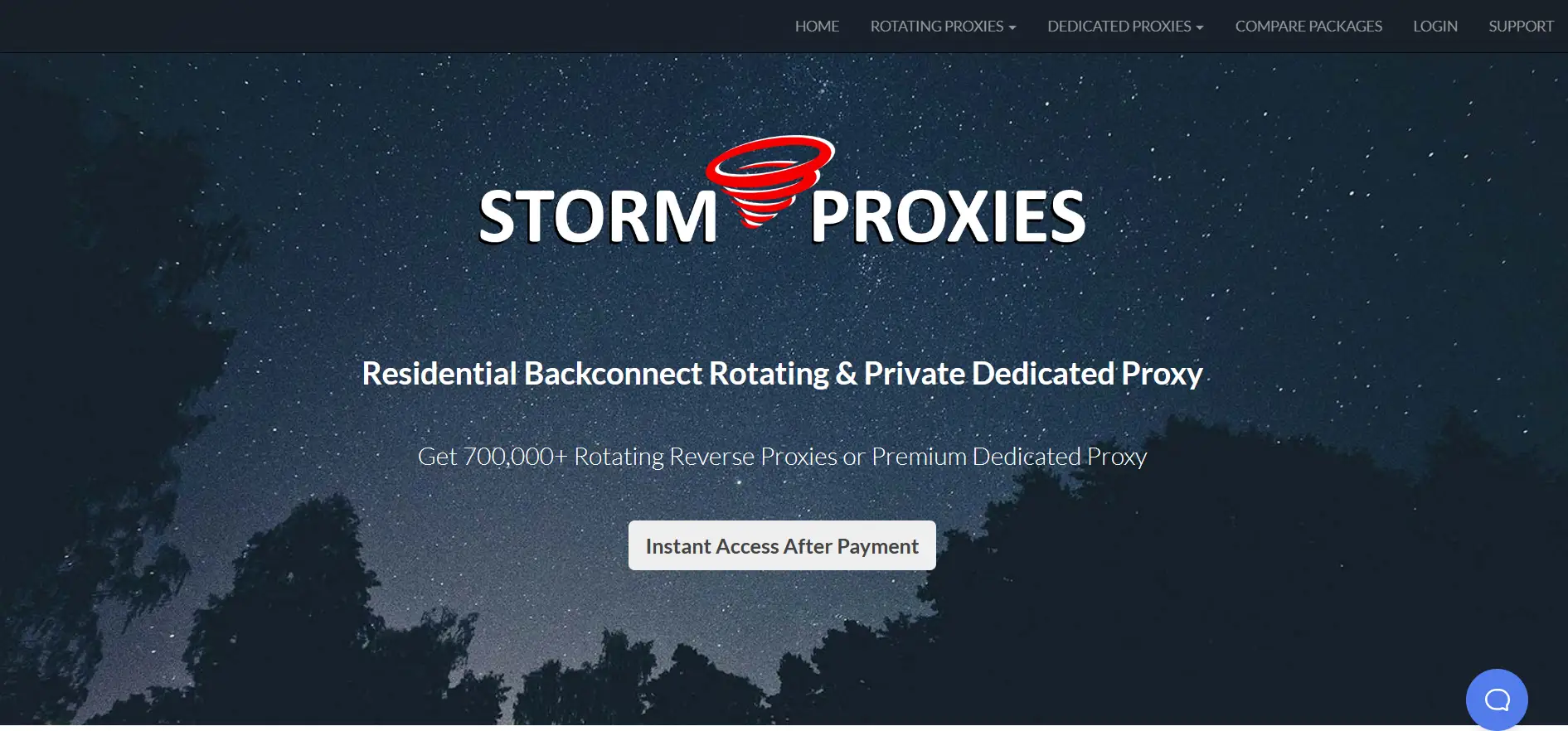
One of the most reliable proxy providers, Storm Proxies, has been around for nearly six years. The relatively small U.S. supplier has made a name for itself by offering targeted services at rock-bottom prices.
In addition to their backconnect proxies, Storm Proxies offers rotating residential proxies for sale. Devices used in the home also contribute to a smaller subset of 70,000 IPs.
They provide unlimited bandwidth—not threads but ports; the main limitation is the number of IPs you may use simultaneously. This works better for web browsing, where multiple threads may be used to load a page. Despite having limited geographic coverage and no free trial, Storm Proxies offers cheap, easy-to-use, and speedy proxy services.
Storm Proxies are inexpensive, provide unlimited bandwidth, are easy to use, and have quick ping times—an average of 101 ms and 6.144 s. Pricing for rotating residential proxies (1 port) starts at $19, while dedicated IPs (10 proxies) are priced at $10. Customer support offers quick email responses.
9) PrivateProxy.me
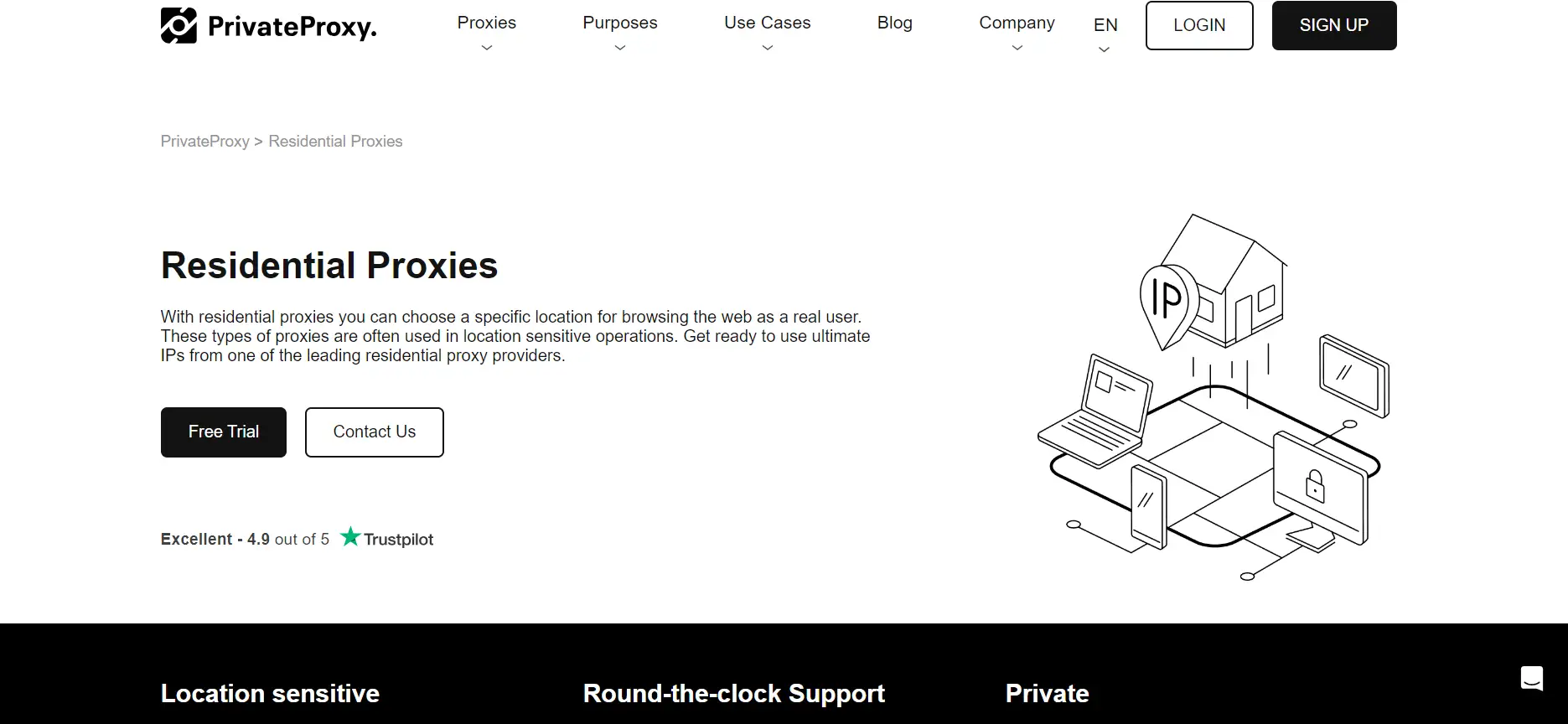
PrivateProxy.me is a premium proxy service based out of the UK that can be used for torrenting, geo-restricted content streaming, and anonymous web browsing.
Their extensive network of supported cities and locations makes them a top choice for residential IPs, making them ideal for scraping and parsing jobs. They’re always trying to find new ways to extend their proxy network. Consequently, you can choose the state or city in which your proxy network is active when purchasing residential IPs.
PrivateProxy.me gives you access to a wide variety of IPs from all supported providers that satisfy your unique application requirements at the lowest feasible price.
PrivateProxy provides premium residential IPs, round-the-clock service, exclusive IPs, and a nearly 100% uptime guarantee. Broad geographic distribution, a large assortment of IPs, and price points for beginners, amateurs, and newbies: Plans for Residential Proxies start at $5, $15, and $50 per month, respectively.
Residential Proxies Vs. Other Types of Proxy Services
Residential Proxies Vs. ISP Proxies
Residential and ISP proxies are two of the most widely used categories of proxies. Each has distinct qualities and applications, and it can be important for you or your company to know when to employ one over the other.
Internet service providers host ISP proxies, which provide quicker speeds but less anonymity. Residential proxies are more anonymous because they use actual IP addresses from residential areas, although they usually operate more slowly.
Residential Vs. datacenter proxies
The two most common kinds of proxies, residential and datacenter, both allow you to conceal your IP address and, among other things, scrape the web anonymously.
The most prevalent kind of proxy is a datacenter proxy, which uses a faraway computer with an IP address to redirect traffic from your device to the intended website. Being totally separate entities, these proxies are unrelated to either your internet connection or your ISP. So, it’s easy to hide your IP address without leaving a trace. There are two options for datacenter proxies: shared and dedicated.
Residential proxies provide Internet Protocol (IP) addresses that are provided by ISPs and are derived from the mobile and desktop devices of typical users in their homes that are linked to Wi-Fi networks. These proxies are ideal for data scraping, jobs requiring authenticity, and privacy maintenance because they are less likely to be blocked. The residential category also includes a few additional kinds of proxies.
A variety of online needs can be met with the important capabilities provided by both residential and datacenter proxies, allowing for secure and efficient web surfing. When it comes to data-heavy jobs, residential proxies are known for their speed and efficiency. On the other hand, datacenter proxies are great for impersonating genuine users and staying anonymous online. Services like 911Proxy, Webshare, and IPRoyal offer proxies from datacenters and are reasonably priced.
The Best Residential Proxy Providers in 2025 (Summary)
- Oxylabs
- Smartproxy
- Bright Data
- SOAX
- Webshare
- IPRoyal
- NetNut
- Storm Proxies
- PrivateProxy.me
Conclusion
Ultimately, selecting a reliable residential proxy is essential if you want to scrape the web without interruptions. Any of the proxy providers we’ve mentioned here, whether it’s Bright Data’s extensive network and extraordinarily fast response times, Smartproxy’s varied IP pool, or Oxylabs, offer dependability that can enhance your experience and increase the effectiveness of web scraping.
To prevent being blocked, the best residential proxy for web scraping should provide a full range of features and quality proxies at a fair price, along with features like rotating proxies and advanced built-in anti-bot bypass, to be precise.
More on Proxy:
- Bright Data Alternatives
- Bright Data Vs. Oxylabs
- Best Shared Proxies
- Best Instagram Proxies
- Best Canada Proxies
- Best YouTube Proxies
- Best Craigslist Proxies
- Best Indian Proxies
- Best Facebook Proxies
- Anonymous Proxies Review
- Best Mobile Proxies
Frequently Asked Questions
Q: Are residential proxies legal?
A: As long as site scraping or market research is the intended objective, the use of residential proxies is entirely legal. However, fraudsters often misuse residential proxies for fraud, spam, and phishing activities, which can have major legal ramifications.
Q: What is the difference between a residential proxy and a normal proxy?
A: Since residential proxies are provided by ISPs, unlike datacenters, they are more difficult to obtain and tend to be priced higher. If proxies set up in datacenters don’t work, residential proxies will.
Q: Can residential proxies be traced?
A: It prevents the target website from seeing the user’s true IP address, making it more difficult to track down the source of the requests. In contrast to proxies generated in a datacenter, which are generated in large batches and can be easily spotted as coming from an untrusted source, residential proxies are generated one at a time.
Q: Which is the largest business residential proxy?
A: The largest proxy service, Bright Data, has a large pool of rotating residential IPs from around the world.

